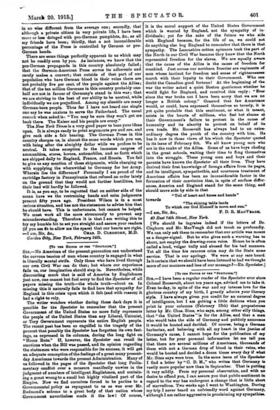[To ea Emma or ram "Serroarot."1
SI12,—No American of the present generation can understand the nervous tension of men whose country is engaged in what is literally mental strife. Only those who have lived through our own Civil War can do that; but where our experience fails us, our imagination should step in. Nevertheless, while discounting much that is said of America by Englishmen just now, one cannot but feel sorry to find the Spectator of all papers missing the truth—the whole truth—about us. In missing this it naturally fails to find here that sympathy for England in this crisis upon which it felt (and with reason) it had a right to rely.
The writer wonders whether during these dark days it is possible for the Spectator to remember that the present Government of the United States no more fully represents the people of the United States than any Liberal, Unionist, or Tory Government represents the entire English people. The recent past has been so engulfed in the tragedy of the present that possibly the Spectator has forgotten its own feel- ings, as expressed in its columns, during the long fight on "Home Rale" If, however, the Spectator can recall its emotions when the Bill was passed, and its opinion regarding the statesmen who were responsible for its succeaa, it will get an adequate conception of the feelings of a great many present- day Americans towards the present Administration. Mery of us followed in the pages of the Spectator that long Parlia- mentary conflict over a measure manifestly unwise in the judgment of numbers of intelligent Englishmen, and contain. ing a great wrong to a small but highly vitalized part of the Empire. Now we find ourselves forced to be parties to a Governmental policy as repugnant to us as was ever Mr. Redmond's scheme to a great body of that nation whose Government noverthelese made it the law! Of course,
it is the moral support of the United States Government which is wanted by England, not the sympathy of in- dividuals; yet for the sake of the future we who side with England because, for the life of ua, we could not do anything else beg England to rememle•r that there is that sympathy. The Lancashire cotton spinners took the part of the North in our Civil War because they knew that the North represented freedom for the slaves. We are equally aware that the cause of the Allies is the cause of freedom for mankind. Just across our northern frostier are regiments of men whose instinct for freedom and sense of right...nets march with their loyalty to their Government. Who can doubt the Canadian good fortune! At the beginning of the war the writer asked a quiet Boston gentleman whether ha would fight for England, and received this reply: "Ever since the war broke out I have been sorry that we are no longer a British colony." Granted that few Americans would, or could, have expressed themselves so tersely, it is yet quite probable that this sentiment. or what it meant, exists in the berets of millions, who feel hot shame at their Government's failure to protest in the came of humanity and its alacrity to protest on behalf of its own trade. Mr. Roosevelt has always bad to an extra- ordinary degree the youth of the country with him. He has it now in those views of his which the Spectator quoted in its issue of February 6th. We all know young men who are in the ranks of the Allies. Some of us have boys chafing in the great schools, waiting their time to fling themselves into the struggle. These young men and boys and their parents have known the Spectator all their lives. They have derived their first knowledge of foreign affairs from its pages. and its intelligent, sympathethio, and courteous treatment of American affairs has been no inconsiderable factor in the formation of their conviction that, in spite of surface differ- ences, America and England stand for the same thing, and should more side by side in that "Toil of heart and knees and hand."
towards "The shining table land, To which our God Rimed is moon and sun,"
—I am, Sir, rho., F. D. R. hiaaVakow. 40 East 74th Street, New York.
[We should be ingrates indeed if the letters of Dr. Cleghorn and Mr. ManYeagh did not touch as profoundly. We can only ask them to remember that our article was meant as a danger-signal. But he who gives such a warning has to shout, not employ the drawing-room voice. Hence he is often called a loud, vulgar bully and abused for his bad manner. Yet all the time his raucous cries may do the State some service. That is our apology. We were at any rate heard le it certain that we should have been listened to had we thought more of our manners, and less of our message Spectator.]






































 Previous page
Previous page